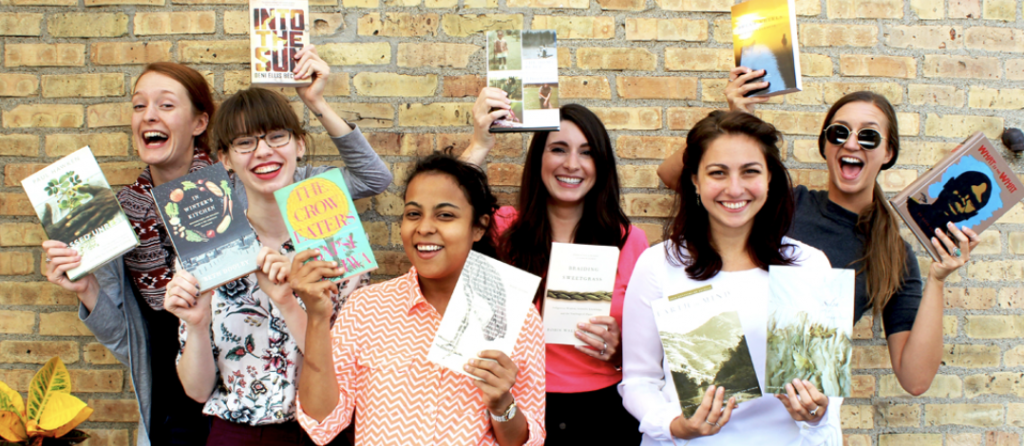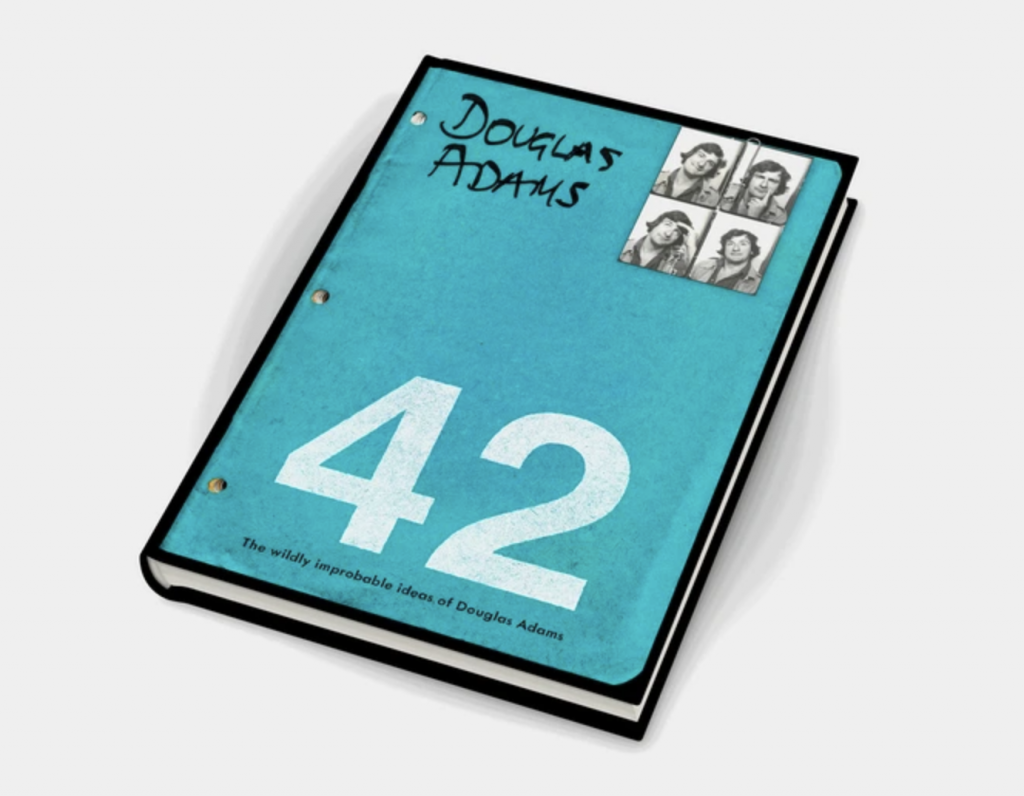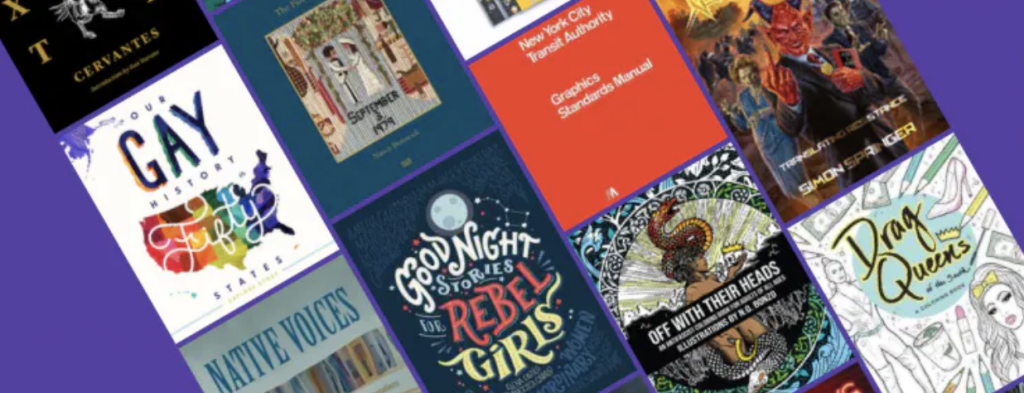We spoke with Oriana Leckert, the Director of Publishing and Comics Outreach at Kickstarter, about Kickstarter Publishing and the importance of supporting independent literary creativity.
Kickstarter Publishing recently celebrated a huge milestone: more than $200 million pledged for publishing since Kickstarter was founded in 2009. How did Kickstarter’s publishing program come about? What is its history and mission?
 Since Kickstarter’s inception, we’ve had a Publishing category. In 2009, the company’s first year, there were 92 Kickstarter Publishing projects, with about $200,000 pledged. As of this writing, we’ve seen a total of $215 million pledged in Publishing, plus another $140 million in Comics, with just under 30,000 projects successfully funded between the two. Not bad for a dozen years!
Since Kickstarter’s inception, we’ve had a Publishing category. In 2009, the company’s first year, there were 92 Kickstarter Publishing projects, with about $200,000 pledged. As of this writing, we’ve seen a total of $215 million pledged in Publishing, plus another $140 million in Comics, with just under 30,000 projects successfully funded between the two. Not bad for a dozen years!
Kickstarter’s overall mission is to help bring creative projects to life; this is foundational to our Public Benefit charter. Since Kickstarter has always existed outside of the traditional media industry, our Publishing category has long been a natural home for voices ignored or undervalued by the mainstream, which is something we’re really proud of. The Kickstarter Publishing and Comics categories are filled with queer voices and diverse voices of all types. Kickstarter is an excellent proving ground for writers who want to maintain creative control over their work and for those who know there’s an audience for what they’re doing but have trouble convincing industry gatekeepers to give them a shot. This means a plethora of both traditional and nontraditional books, magazines, and comics in every genre, as well as so much more. To celebrate crossing the $200 million milestone last year, we put together a massive roundup of 117 Publishing Projects Showing What’s Possible on Kickstarter, which includes everything from zines to digital media outlets to podcasts, from literary festivals to literary museums to literary swag. It was such a joy to write that up, looking back over a decade of fiercely independent literary creativity.
What drew you to Kickstarter? Why is it important to support authors and small publishers, and how has your previous work—as a writer, editor, bookstore manager, and more—informed your interest in this space?
 I’ve indeed had a fairly nonlinear career path—I was a manager at the Strand Bookstore, I edited crossword puzzle books at Random House (back before it absorbed Penguin!), I’ve been a matchmaker for ghostwriters, a reader for a literary agency, a fact-checker at a book packaging company. Through all that, I’ve done freelance editing for about 100 small presses and digital media outlets, and I’ve also spent about a decade as an arts and culture journalist. So I’ve truly worked all across the literary landscape, which has given me tremendous respect for independent creators, a healthy distrust of corporate culture, and an abiding appreciation for building community around creative practice. I’ve always been drawn to the margins, to overlooked ideas, to mutual aid and radical transparency, and I want to nurture unique and bizarre ideas wherever I find them. Of course there’s wonderful work being done at the major publishing houses and in the legacy media, but I’m much more interested in the fringes, the indie presses and journalistic collectives and niche literary magazines, where moonshot ideas are more likely to find their footing.
I’ve indeed had a fairly nonlinear career path—I was a manager at the Strand Bookstore, I edited crossword puzzle books at Random House (back before it absorbed Penguin!), I’ve been a matchmaker for ghostwriters, a reader for a literary agency, a fact-checker at a book packaging company. Through all that, I’ve done freelance editing for about 100 small presses and digital media outlets, and I’ve also spent about a decade as an arts and culture journalist. So I’ve truly worked all across the literary landscape, which has given me tremendous respect for independent creators, a healthy distrust of corporate culture, and an abiding appreciation for building community around creative practice. I’ve always been drawn to the margins, to overlooked ideas, to mutual aid and radical transparency, and I want to nurture unique and bizarre ideas wherever I find them. Of course there’s wonderful work being done at the major publishing houses and in the legacy media, but I’m much more interested in the fringes, the indie presses and journalistic collectives and niche literary magazines, where moonshot ideas are more likely to find their footing.
What does your work as Kickstarter’s Director of Publishing & Comics Outreach entail?
One of my colleagues has described our work as helping people finance their dreams, which I think is perfect. My job is to be out in the worlds of publishing, comics, and the media, helping creators better understand our platform, working to determine whether it makes sense for them, and then helping to set them up for success if they decide it does. These days, that equals a whole lot of Zoom strategy sessions to brainstorm campaign ideas and share crowdfunding best practices, as well as plenty of virtual panels, webinars, podcasts, and the like. In more normal times, I also attend lots of conferences and gatherings, and I put on events to bring people across the literary world together.
Can you tell us about a few publishing campaigns that have stood out to you as particularly successful or interesting? What are some current publishing campaigns you’re watching closely?
 On the publisher side, it’s thrilling to see indie presses incorporating Kickstarter into their business models. Publishers like PM Press, Microcosm Pubilshing, and Iron Circus Comics run a campaign every month or so, funding everything from a an oral history of punk music to a practical witch’s almanack to a queer Edwardian graphic novel. Flamingo Rampant, Enchanted Lion Books, and Birdcage Bottom Books each recently funded an entire season’s worth of books. Mouse Books ended 2020 with a box set of books about Hell; Et Alia Press put out a children’s book on the magic of Black hair; 3dtotal Publishing does lovely artists’ books; Cast Iron Books makes unusual graphic novels; Beehive Books creates exquisite illustrated editions of literary masterworks.
On the publisher side, it’s thrilling to see indie presses incorporating Kickstarter into their business models. Publishers like PM Press, Microcosm Pubilshing, and Iron Circus Comics run a campaign every month or so, funding everything from a an oral history of punk music to a practical witch’s almanack to a queer Edwardian graphic novel. Flamingo Rampant, Enchanted Lion Books, and Birdcage Bottom Books each recently funded an entire season’s worth of books. Mouse Books ended 2020 with a box set of books about Hell; Et Alia Press put out a children’s book on the magic of Black hair; 3dtotal Publishing does lovely artists’ books; Cast Iron Books makes unusual graphic novels; Beehive Books creates exquisite illustrated editions of literary masterworks.
A couple live campaigns I’m particularly excited about at the moment are Unbound’s 42: The Wildly Improbable Ideas of Douglas Adams, a deluxe hardcover compendium of never-before-seen extracts from his archive; Hiveworks’s Stutterhug, “a book of tiny mental hugs to turn to if you’re having a bad day”; and Facsimile Finders’s La Divina Commedia, a hand-illustrated, fully illuminated, fine-press edition of Dante’s masterwork.
We also see a lot of literary magazines using Kickstarter to launch, like Inque and New Modality, as well as repeat creators like Protean and F(r)iction, which run campaigns for each issue or season, gaining more fans and raising more money each time. A few I love right now are Radicle Threads, aimed at Black, Brown, and Indigenous folks in the crafting community; and Inclusive Future, an anthology of speculative writing “in the guise of a pop culture magazine from the future.”
Do you have any recommendations for publishers interested in starting a Kickstarter campaign?
Well first, talk to me! I’d love to help brainstorm how Kickstarter can help you achieve your goals, and strategize how to put a campaign together. But the place I usually tell people to start from is: What’s your wild idea, the book (or book-adjacent creative work) you’d love to make if you didn’t have to worry about P&Ls, return rates, or risks? Often a starter campaign for a small press is a book that’s too niche, too expensive, or too ambitious for their regular operations. These kinds of projects allow you to prove that there’s an audience that’s excited for the book you want to make, as well as get the funding in advance, which greatly reduces the risk of taking a big swing.
You recently launched a partnership with Bookshop. Can you tell us more about how that came about and how it’s going?
 I’m personally a tremendous fan of Bookshop and what they’re doing to support indie bookstores, so I’m overjoyed about this initiative. The idea is to celebrate the long lives that books launched on Kickstarter can go on to lead. On Kickstarter’s Bookshop storefront, we’ve curated lists of 170+ literary works—from books to comic books to kids’ books to cookbooks—that were originally funded on Kickstarter and are now available for sale through the traditional publishing trade. Many of these are independently published, but it was also so thrilling to see how many small presses have used our platform over the years, including McSweeney’s, Copper Canyon Press, Archipelago Books, BOA Editions, Red Hen Press, Tupelo Press, Restless Books, Small Beer Press, Dynamite Entertainment, and Boom Studios—just to name a few. This storefront functions as an affiliate page, and Kickstarter donates all commissions we receive to NYC Books Through Bars, an all-volunteer collective that sends free books to incarcerated people across the country. And these lists are very much a work in progress! I plan to add to them regularly, and there’s also a form for folks to submit a book for inclusion.
I’m personally a tremendous fan of Bookshop and what they’re doing to support indie bookstores, so I’m overjoyed about this initiative. The idea is to celebrate the long lives that books launched on Kickstarter can go on to lead. On Kickstarter’s Bookshop storefront, we’ve curated lists of 170+ literary works—from books to comic books to kids’ books to cookbooks—that were originally funded on Kickstarter and are now available for sale through the traditional publishing trade. Many of these are independently published, but it was also so thrilling to see how many small presses have used our platform over the years, including McSweeney’s, Copper Canyon Press, Archipelago Books, BOA Editions, Red Hen Press, Tupelo Press, Restless Books, Small Beer Press, Dynamite Entertainment, and Boom Studios—just to name a few. This storefront functions as an affiliate page, and Kickstarter donates all commissions we receive to NYC Books Through Bars, an all-volunteer collective that sends free books to incarcerated people across the country. And these lists are very much a work in progress! I plan to add to them regularly, and there’s also a form for folks to submit a book for inclusion.
What are some of your hopes and goals for Kickstarter Publishing going forward?
As the economics of print publishing and digital media become ever more tenuous, and as readers’ fractured attention gets harder and harder to catch, I hope that more writers and publishers discover our platform and continue to use it to create unique, innovative, and boundary-pushing literary works. And I hope to keep helping to make that happen! It sounds cheesy, but this is the most inspiring work I’ve done throughout my whole strange career, and I am so excited to help many more writers, illustrators, editors, podcasters, magazine-makers, and publishers fund their dreams.
